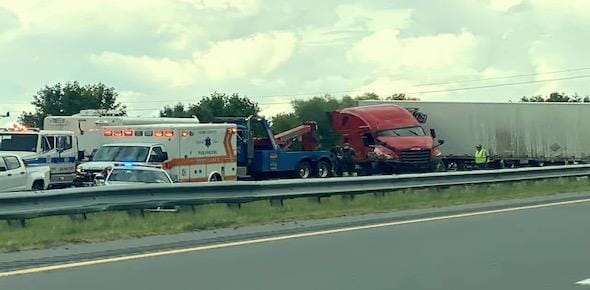Were you hurt in a collision with a large truck? If you believe a commercial truck driver or trucking company is at fault for your injuries, talk with a lawyer right away. Truck accident claims are hard enough to pursue. The trucking company and its insurer have the upper hand because they have the ability to act quickly while you are nursing your wounds. They’ll get to inspect the aftermath of the collision before you do. They know the ins and outs of the law and their insurance coverages available. It’s up to you to hire an experienced truck accident attorney who can level the playing field by investigating the crash on your behalf and fight for your fair compensation.
Our legal team at The Joseph Dedvukaj Firm, P.C. is well-versed in Michigan law and federal trucking regulations. We take an in-depth look into the crash scene, the trucker’s background, the trucking company accident history, and any other parties involved to see if they’re responsible for one or more regulatory violations and ultimately negligence. To learn more about state and federal trucking regulations and how to identify a violation that may help your claim, call us at 866-HIRE-JOE or use our online contact form. We give free consultations.
The Federal Motor Carrier Safety Administration
The FMCSA was created by the Motor Carrier Safety Improvement Act of 1999 to improve truck driver safety. It’s a separate governmental agency at the U.S. Department of Transportation. The purpose of the FMCSA is to establish regulations that lower the number of large truck and bus accidents which result in injuries and fatalities. To accomplish this goal, the FMCSA creates and enforces commercial trucking regulations from time to time.
FMCSA Trucking Regulations Size and Weight Restrictions
The FMCSA dictates how large and heavy commercial trucks and buses can be on the interstate highway system. States also have limits on commercial trucks. When a truck is going to be over-sized because of the cargo its carrying, this becomes a state or local safety issue. The Michigan Department of Transportation also has regulations on how large trucks can be on the road.
Hours of Service
Some of the most controversial FMCSA regulations are hours of service (HOS) limits. These safety rules dictate how long truckers can work in a given period of time, such as during one workday and a work week. Drivers can operate a vehicle up to 11 hours after 10 consecutive hours off or up to 10 hours after 8 consecutive hours off. Although drivers are prohibited from driving beyond the 14th consecutive hour after they come on duty. For a work week, they can drive 60 or 70 hours over 7 or 8 consecutive days. A truck driver can restart a new work week after 34 consecutive hours or more off duty. Truck drivers are required to keep driver logs.
Electronic Logging Device
The FMCSA tried to curb forged driver logs by adopting a December 2019 deadline for all fleets to switch to ELD’s to log their drivers’ hours of service.
Motor Carrier’s Duty to Maintain
The truck safety regulations specifically mandates all motor carriers and intermodal equipment providers have to have a systematic way to inspect, repair, and maintain all of their commercial vehicles and equipment. Everything on the truck needs to be in safe and proper working order at all times and records must be maintained.
Truck Inspections
The FMCSA regulate when truck drivers and companies must inspect their commercial vehicles. Drivers are required to fill-out driver commercial vehicle inspection reports at the end of each workday. The inspection report has pre-determined long checklist of each area and part of the truck or bus that the driver needs to inspect for wear and tear or more significant damage. The driver also has to inspect the vehicle before starting to transport a new haul or route. Truck drivers must be confident the commercial vehicle is in safe working order and sign off on the previous driver’s vehicle inspection report before they get behind the wheel.
Maintain Insurance
The FMCSA also dictates how much insurance motor carriers must carry which will depend on the type of cargo and weight of freight. For example, non-hazardous freight in a vehicle weighing less than 10,001 lbs. must be insured for at least $300,000. Other shipments, depending on the commodity and their weight, have to be insured at a minimum of $750,000 and up to $5 million. Passenger vehicles also require significant insurance liability limits.
Hazardous materials Transport
FMCSA safety regulations define what kind of material being transport by truck constitutes hazardous materials, how the material must be safely transported, and the warnings about the specific category of hazardous material the commercial vehicles must have when carrying the hazmat load.
Alcohol and Drug Testing
The FMCSA has safety rules covering pre-employment, post-accident, random, reasonable suspicion, and return-to-duty testing for alcohol and controlled substances. Drivers are prohibited from drink alcohol while on duty, and they can’t perform safety-sensitive functions without four hours off drinking. The DUI legal threshold is .04 percent blood-alcogol concentration limit for truck drivers. This is half the legal limit for passenger vehicle drivers.
Drug and Alcohol Clearinghouse
As of January 2020, the U.S. Department of Transportation’s Drug and Alcohol Clearinghouse is open. This is an online database of drivers who aren’t allowed to operate trucks or perform other safety-sensitive functions because of a drug or alcohol violation.
CDL DUIs
If a driver is caught with a blood alcohol concentration of 0.04 or more, they’ll be charged with a DUI. A DUI conviction leads to the loss of the driver’s license for a time or if successive violation permanent loss of a driver license.
Michigan Trucking Regulations Licensing
Michigan’s Secretary of State is in charge of when and how you can get a Commercial Driver’s License (CDL) or additional endorsements for your CDL. Endorsements are special requirements for certain types of vehicles such as hazardous material endorsement. An CDL endorsement shows the truck driver has the knowledge and skills necessary to operate that vehicle safely for that particular trucking activity. To get a license, drivers are expected to pass a knowledge and skills test.
Truck Size and Weight Limits
All commercial vehicles driving through Michigan have to adhere to Michigan’s Bridge Formula which determines the permitted maximum weight and size allowed for truck’s on Michigan highways. There are also maximum dimensions and weights depending on the class of the vehicle. An oversized or overweight truck needs to get a permit from MDOT before it can get on the road.
Vehicle Registration
Michigan, like all states, requires trucks that are going to do business in the state to register here. A motor carrier that works exclusively within Michigan will register here. Other interstate trucking companies will obtain apportioned plates, which are the type of plate you receive when you register under International Registration Plan (IRP) which allows them to travel throughout several member states.
Attorneys Must Be Careful To Investigate State and Federal Truck Regulatory Violations
Your skilled attorney at The Joseph Dedvukaj Firm knows that the federal and state trucking regulations above are only a small sample of all the rules trucking companies and drivers need to comply with and follow in their day to day truck driver activities at the time of your accident. Finding violations of one or more of these regulations means defective trucks and unqualified drivers might be on the road when your crash happened. It can be negligence, and it’s dangerous to violate the laws or regulations. After you’re hurt or lose a loved one in a trucking accident, it’s crucial that you contact an experienced attorney to thoroughly investigate the accident and look for violations of state law or federal trucking regulations. Evidence of violations can help you establish a personal injury or wrongful death claim and win compensation. Use our online appointment form or call 866-HIRE-JOE to learn more from The Joseph Dedvukaj Firm Accident Injury Lawyers.


